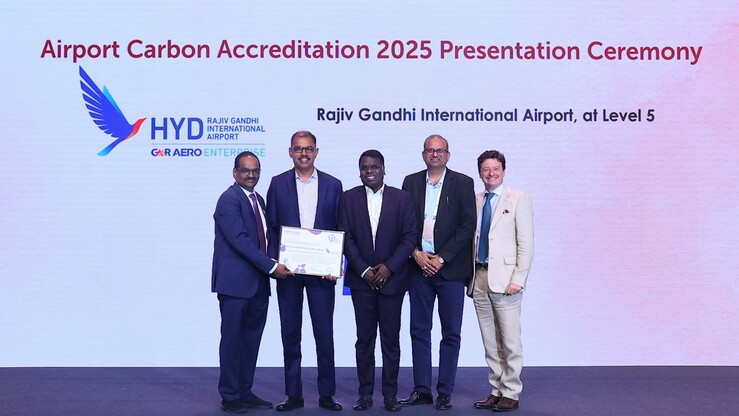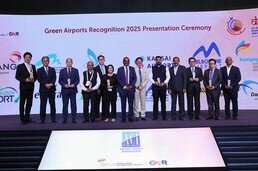
GHIAL operated Rajiv Gandhi International Airport achieves prestigious ACA Level 5 Carbon Accreditation
- 2025-04-22
GMR Hyderabad International Airport Ltd (GHIAL) operated Rajiv Gandhi International Airport (RGIA) announced that it has been awarded the Level 5 Accreditation under the globally recognized Airport Carbon Accreditation (ACA) programme by Airports Council International (ACI). The ACA programme is the industry standard for the assessment of an airport’s efforts to manage and reduce carbon emissions. The ACA programme comprises 7 levels, with Level 5 being the highest.
This milestone places RGIA among the top four airports in the ACI Asia-Pacific & Middle East region to achieve Level 5 — the highest level of carbon management certification under the ACA framework. The accreditation reflects RGIA’s commitment to aligning with global climate goals, maintaining net zero CO₂e emissions for Scope 1 and 2, and striving towards net zero Scope 3 emissions by 2050 or earlier.
Speaking on this milestone accomplishment, Mr. SGK Kishore, ED & Chief Innovation Officer, GMR Airports and President - Airport Council International (ACI) Asia Pacific & Middle East ( ACI APAC & MID) said: “Hyderabad Airport will continue its sincere efforts for sustaining net zero emissions on Scope 1 & 2 emissions and collaborate with the airport stakeholders to achieve Net Zero Scope 3 emissions by 2050 in alignment with the UNFCCC Paris Agreement's (2015) temperature goal to combat climate change.”
Congratulating Hyderabad Airport on this achievement, Mr. Stefano Baronci, Director General, ACI Asia-Pacific & Middle East, said: “Indian airports are leading the way in environmental sustainability. The achievements of Hyderabad International Airport further establish India’s pioneering role in decarbonisation. These successes result from a long-term vision and the dedicated efforts of their teams and industry partners. We hope these milestones inspire other airports in our region to embrace sustainability and implement initiatives for a more environmentally responsible aviation industry. ACI APAC & MID remains committed to supporting our members in developing their roadmaps to achieve net-zero targets.”
Key Sustainability Initiatives at RGIA
Rajiv Gandhi International Airport has adopted a strategic and comprehensive approach to carbon management through a wide range of initiatives across Scope 1, 2, and 3 emission categories:
Scope 1 (Direct Emissions):
Deployment of Electric vehicles (EVs), use of biofuels, installation of EV charging stations, and use of low-GWP (Global Warming Potential) refrigerants.
Scope 2 (Indirect Energy Emissions):
Utilization of 100% renewable energy through an on-site 10 MWp solar power plant and green power procurement. Implementation of energy-efficient systems in lighting, Heating, Ventilation and Air Conditioning (HVAC), and airport operations.
3 (Third-Party Emissions):
Collaborations with airlines and ground handling agencies for low-emission practices, including single-engine taxiing, electric Ground Support Equipment (GSE), pre-conditioned air supply for aircraft on stands, operationalization of the GSE tunnel, exploring the use of SAF in future, etc.
Highlights of Carbon Emission Reduction Measures:
- Energy-efficient green buildings, including the LEED-certified Passenger Terminal Building.
- Greenbelt development, acting as a natural carbon sink, absorbing ~700 tCO₂/year.
- Replacement of conventional ground vehicles with solar and electric alternatives.
- Deployment of smart energy management systems, LED retrofits, and advanced HVAC upgrades.
- Regular internal audits and ISO 50001:2018 energy management compliance.
These initiatives are part of GHIAL’s broader commitment to United Nations Sustainable Development Goal 13 (Climate Action) and reflect the airport’s proactive approach to mitigating climate change impacts.
The ACA programme, introduced by ACI in 2011, is the global standard for assessing airport efforts to manage and reduce carbon emissions. The programme comprises seven progressive levels, with Level 5 recognizing airports that have achieved Net Zero CO₂e for direct emissions and established strong stakeholder partnerships to address indirect emissions.








